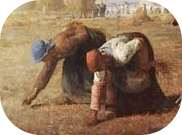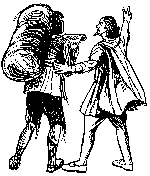
GLEANINGS IN THE PSALMS
(Psalm 69)
Title . “A Psalm of David.” If any enquire, “Of whom speaketh the psalmist this? Of himself, or some other man?” We would reply, “Of himself, and of some other man.” Who that other is, we need not be long in discovering; it is the crucified alone who can say, “in my thirst they gave me vinegar to drink.” His footsteps all through this sorrowful song have been pointed out by the Holy Spirit in the New Testament, and therefore we believe, and are sure, that the Son of Man is here.
C.H. Spurgeon
Verse 1. “Save me, O God; for the waters are come in unto my soul.” “He saved others, himself he cannot save.” With strong cryings and tears He offered up prayers and supplications unto Him that was able to save Him from death, and was heard in that He feared (Hebrews 5:7) Thus David prayed, and here his Son and Lord utters the same prayer. It is remarkable that such a scene of woe should be presented to us immediately after the jubilant ascension hymn of the last psalm, but this only shows how interwoven are the glories and the sorrows of our ever blessed Redeemer. The head which is now crowned with glory is the same which wore the thorns; He to whom we pray, “Save us, O God,” is the selfsame person who cried, “Save me, O God.”
C.H. Spurgeon
Verse 3. “I am weary of my crying: my throat is dried: mine eyes fail while I wait for my God.” He had cried to God for the ways of man; He had cried to man about the ways of God. He had not ceased from the very first to preach, and at last on the cross, He cried, “I thirst!” His eyes had grown dim, and His flesh was faint and weary with His sufferings, through the long passion of His life on earth. He had been waiting in poverty, and insult, and treachery, and scourging, and pain until He finally cried, “My God, my God, why hast thou forsaken me?"”
From “A Plain Commentary”
Verse 4. “They that hate me without a cause are more than the hairs of mine head … then I restored that which I took not away.” crushing testimony against the Saviour in the eyes of His enemies was this ̫ “Let him be crucified, for he hath made himself the Son of God.” They believed that He was endeavouring to rob God of His glory, yet none was ever less guilty of this, and the very opposite was the case; so, indeed, they “hated him without a cause.” The devil tried to take away the glory of God when he boasted that he was like unto the Most High God; our first parents tried to take away the glory of God when they finally wilted to that enticing word, “… the day that ye eat thereof, ye shall be as gods, knowing good and evil.” But, Christ already possessed that equality of glory with the Father from before the world was, and by His death and endless life was “restored” that glory of God in the hearts of His believing remnant, so that the words are His alone in all their fulness, “I restored that which I took not away.”
Verse 9. “For the zeal of thine house hath eaten me up …” Zeal for true religion is a praise-worthy thing, even though it be out of favour with those men who sit still, and love to be at quiet rest. Yet, it is no disgrace for any child of God to have the zeal of the house of God to eat him up. It is slanderous to call it folly. Lukewarm men call it folly; God's Spirit calls it “a live coal” that has a most vehement heat. Was David rash? No, he was fervent; was Paul mad, when Felix said he was “beside himself”? Was Christ indiscreet when they said the same of Him. Is the judgment of such stolid men any disparagement to zeal? Nay, it is a commendation.
From David Wilson
Verse 9. “For the zeal of thine house” etc. Consider the examples of the saints of old, who have taken heaven by force. How industrious was Calvin in the Lord's vineyard. When his friends persuaded him for his health's sake to remit a little of his labour, saith he, “Would you have the Lord find me idle when He comes?” It is said of Holy Bradford, preaching, reading, and prayer, was his whole life. I rejoice, said Jewel, that my body is exhausted in the labours of my holy calling. How violent were the blessed martyrs! They wore their fetters as ornaments, they snatched up torments as crowns, and embraced the flames as cheerfully as Elijah did the fiery chariot that came to fetch him to heaven. Let racks, fires pullies, and all manner of torments come, so I may win Christ, said Ignatius. Those pious souls, “resisted unto blood.” How should this provoke our zeal!
Tomas Watson




